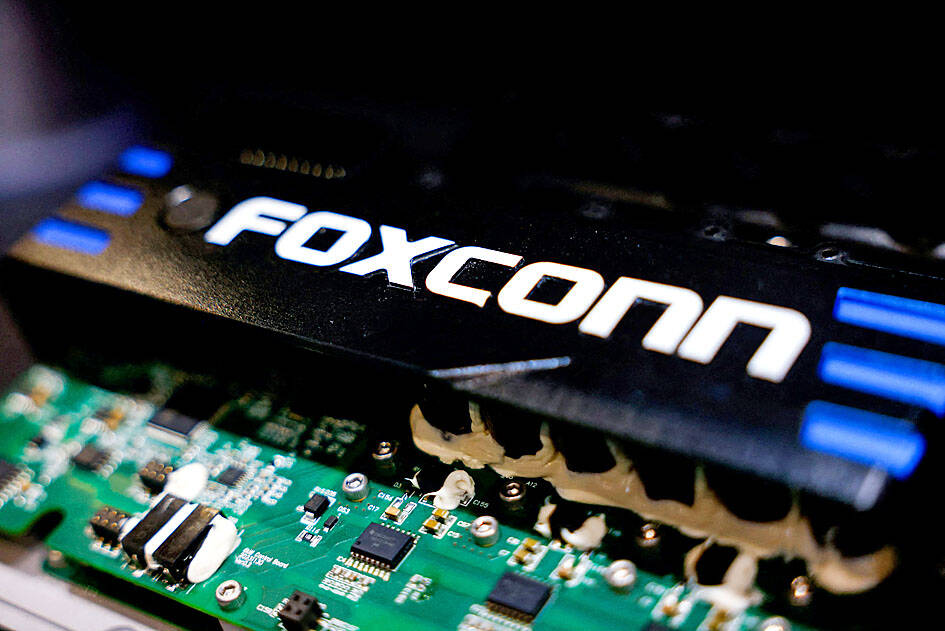Apple Inc. supplier Hon Hai Precision Industry Co (鴻海精密), also known as Foxconn Technology Group (富士康科技集團), and Dixon Technologies India Ltd are asking India to pay them billions of rupees in subsidies they think they are entitled to under the government’s production incentives program.
The government pledged a total of 410 billion rupees (US$4.8 billion) in subsidies to manufacturers, and part of that remains unallocated because some companies did not meet estimated production targets. Foxconn and Dixon argue that, according to the program rules, they are eligible for some of the unallocated funds, people familiar with the matter said.
Foxconn could get as much as 6 billion rupees and Dixon 1 billion rupees if the government releases the funds, the sources said, asking not to be identified as the matter is not public. The government is reviewing the two requests, the people said.

Photo: Ann Wang, Reuters
Representatives of Foxconn, Dixon and Indian Ministry of Electronics and Information Technology did not respond to requests for comment.
Indian Prime Minister Narendra Modi’s production-linked subsidy plan set annual value-based thresholds for global and local electronics firms, capped at certain levels. The project also envisaged that any unused subsidies, resulting from some companies failing to produce enough to hit their caps, would be allocated to the remaining eligible applicants that exceeded theirs.
Foxconn’s roughly 300 billion rupees of iPhone production in the fiscal year through March 2023 exceeded its cap of 200 billion rupees, and Dixon’s production of 80 billion rupees in the fiscal year through March last year surpassed its cap of 60 billion rupees.
While the amount of money at stake in the unallocated funds debate is relatively small, it is an important test of Modi’s industrial policy ambitions. Companies want to see the administration follow through on regulations that have led to significant investments, including Apple partners assembling US$14 billion of iPhones locally last fiscal year as they diversify beyond China. South Korea’s Samsung Electronics Co has also levered the plan to step up exports.
The stability of Indian policy making becomes even more important as India tries to woo chipmakers, and tech giants such as Microsoft Corp plan to invest billions in the world’s most populous country to expand cloud computing and artificial intelligence.
To be sure, the Modi administration regularly releases subsidies within the cap to all companies participating in the drive.
In contract manufacturer Dixon’s case, the government is also reviewing whether the supplier made new investments for producing Xiaomi Corp’s (小米) smartphones or whether machines were merely shifted out of another factory which previously assembled the Chinese brand’s devices, one of the sources said.
Xiaomi has lost ground to rival smartphone makers in India, which has led to lower production of its devices, which further complicates the handing of funds meant to boost smartphone output.

When an apartment comes up for rent in Germany’s big cities, hundreds of prospective tenants often queue down the street to view it, but the acute shortage of affordable housing is getting scant attention ahead of today’s snap general election. “Housing is one of the main problems for people, but nobody talks about it, nobody takes it seriously,” said Andreas Ibel, president of Build Europe, an association representing housing developers. Migration and the sluggish economy top the list of voters’ concerns, but analysts say housing policy fails to break through as returns on investment take time to register, making the

‘SILVER LINING’: Although the news caused TSMC to fall on the local market, an analyst said that as tariffs are not set to go into effect until April, there is still time for negotiations US President Donald Trump on Tuesday said that he would likely impose tariffs on semiconductor, automobile and pharmaceutical imports of about 25 percent, with an announcement coming as soon as April 2 in a move that would represent a dramatic widening of the US leader’s trade war. “I probably will tell you that on April 2, but it’ll be in the neighborhood of 25 percent,” Trump told reporters at his Mar-a-Lago club when asked about his plan for auto tariffs. Asked about similar levies on pharmaceutical drugs and semiconductors, the president said that “it’ll be 25 percent and higher, and it’ll

CHIP BOOM: Revenue for the semiconductor industry is set to reach US$1 trillion by 2032, opening up opportunities for the chip pacakging and testing company, it said ASE Technology Holding Co (日月光投控), the world’s largest provider of outsourced semiconductor assembly and test (OSAT) services, yesterday launched a new advanced manufacturing facility in Penang, Malaysia, aiming to meet growing demand for emerging technologies such as generative artificial intelligence (AI) applications. The US$300 million facility is a critical step in expanding ASE’s global footprint, offering an alternative for customers from the US, Europe, Japan, South Korea and China to assemble and test chips outside of Taiwan amid efforts to diversify supply chains. The plant, the company’s fifth in Malaysia, is part of a strategic expansion plan that would more than triple

Taiwanese artificial intelligence (AI) server makers are expected to make major investments in Texas in May after US President Donald Trump’s first 100 days in office and amid his rising tariff threats, Taiwan Electrical and Electronic Manufacturers’ Association (TEEMA, 台灣電子電機公會) chairman Richard Lee (李詩欽) said yesterday. The association led a delegation of seven AI server manufacturers to Washington, as well as the US states of California, Texas and New Mexico, to discuss land and tax issues, as Taiwanese firms speed up their production plans in the US with many of them seeing Texas as their top option for investment, Lee said. The